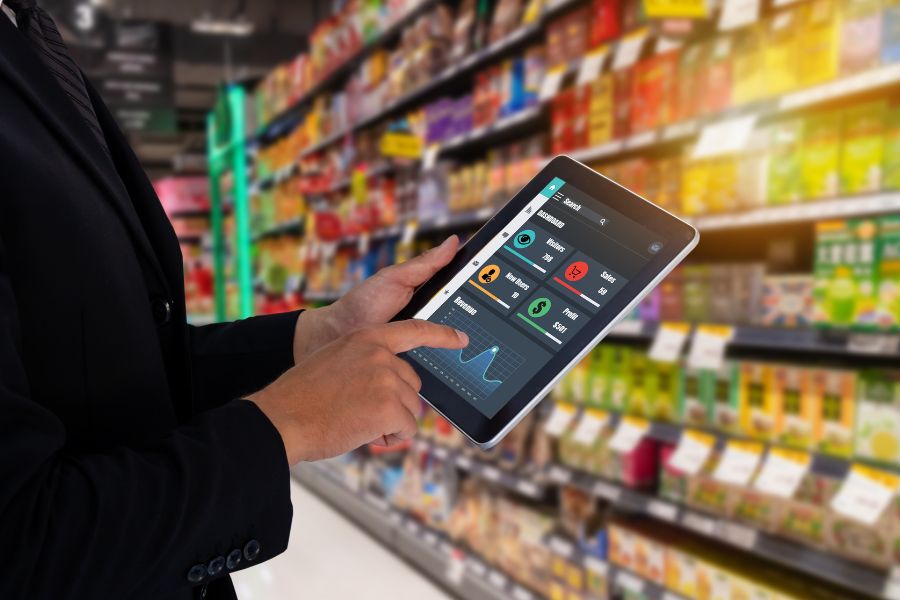The digital transformation in retail has significantly sped up operations and improved accuracy across the board. This advancement is powered mainly by sophisticated data and predictive analytics systems, enabling retailers to make informed decisions. Central to these insights are the Internet of Things (IoT) and, more importantly, artificial intelligence. AI has provided the retail industry with crucial data, leading to improved operations and new growth opportunities. Remarkably, AI innovations in retail have contributed to an estimated $40 billion in additional revenue over just three years. This article will explore the key aspects of artificial intelligence in retail industry, providing insights that can benefit your retail business.
Highlights
- AI in retail refers to the use of advanced algorithms and machine learning to analyze data, automate processes, and enhance customer experiences across both online and physical stores.
- AI drives personalized shopping experiences, optimizes inventory management, reduces operational costs, and improves decision-making by providing data-driven insights.
Why Is AI Important in Retail?
Artificial intelligence is reshaping the retail industry by addressing significant challenges such as unpredictable customer behavior and high labor costs. These factors contribute to the industry’s typically tight profit margins—about 2.5% for general retailers and even lower for grocery stores.
AI can increase profit margins by improving the effectiveness of marketing campaigns, assortment planning, and other sales strategies. For example, while retailers often group products commonly purchased together, like peanut butter and jelly, AI can suggest additional complementary products and predict how promoting one item might impact sales of related items.
AI also refines product descriptions provided by manufacturers, creating a more appealing language for consumers. It aids in boosting customer satisfaction and loyalty by providing human agents with relevant information for better after-sales service. AI algorithms can also deliver personalized product recommendations and marketing messages based on customer purchase histories and behaviors.
In addition, AI-enabled robots can perform tasks such as checking shelves for out-of-stock items or cleaning spills, allowing retailers to assign store associates to more valuable roles like customer assistance.
Technologies and Solutions for AI in Retail
Artificial intelligence is a buzzword in many industries, yet its meaning often needs to be clarified. Artificial intelligence in retail industry encompasses machine learning and predictive analytics, which can collect, process, and analyze vast amounts of data. This data is then used to predict trends, make forecasts, and support retailers in making accurate, data-driven decisions.
Below are some key AI technologies and solutions making a significant impact in the retail industry:
Machine Learning
Automatically analyzes data to identify patterns and trends, enabling retailers to make accurate predictions about customer behavior, demand forecasting, and inventory management.
Predictive Analytics
Uses historical data to forecast future outcomes, helping retailers optimize pricing strategies, plan promotions, and manage inventory more effectively.
Natural Language Processing (NLP)
Enhances customer interactions by powering chatbots, virtual assistants, and personalized product recommendations, improving customer engagement and satisfaction.
Computer Vision
Allows AI systems to process and interpret visual data, enabling applications like automated checkout systems, shelf monitoring, and loss prevention.
Behavioral Analytics
Provides deeper insights into customer behavior by analyzing data from multiple touchpoints, allowing for more personalized marketing and tailored customer experiences.
Customer Intelligence Platforms
Integrates data from various sources to build detailed customer profiles, which can be used to deliver highly personalized marketing messages and product recommendations.
IoT Integration
Connects physical retail environments with digital systems, allowing for real-time monitoring of inventory levels, store traffic, and other critical metrics.
Robotics and Automation
Automates routine tasks such as shelf scanning, inventory restocking, and floor cleaning, freeing up staff to focus on higher-value activities like customer service.
How Artificial Intelligence is Reshaping the Retail Industry
Retail sales are driven by emotions, unlike the often impersonal B2B transactions. Shoppers may spend time comparing products, reading reviews, tracking prices, and browsing catalogs, only to make an unexpected impulse buy.
These emotional shifts are common but hard to measure and address with traditional methods. Artificial intelligence in the retail industry helps retail businesses by using machine learning to monitor customers and guide them toward quicker decisions. AI’s role in retail is yielding tangible benefits for both online and physical shopping, turning what once seemed like science fiction into everyday reality.
Automated Checkouts
The shift towards cashier-less checkouts and fully automated stores is now a major focus for almost all leading retail chains. While companies like Walmart are improving the customer experience with self-service checkout kiosks, others such as Tesco, Rewe, Netto, Aldi, and Wakefarm are advancing the checkout process by harnessing artificial intelligence.
In 2018, a significant milestone in the intersection of artificial intelligence in retail industry was reached with the opening of the first Amazon Go store in Seattle. This marked the beginning of a new era where many businesses sought to enhance shopping experiences and lower operational costs across various malls and shopping centers.
Amazon Go stores, along with their counterparts, use high-definition cameras, various sensors, and machine learning/deep learning algorithms to simplify the shopping process. Customers only need to scan a QR code upon entering, pick up the items they need, and walk out without waiting in line or interacting with a cashier. The total amount is automatically charged to their card as they exit the store.
In 2018, around 350 stores worldwide offered a fully autonomous checkout process. This number is expected to rise significantly, with projections estimating 10,000 stores featuring autonomous checkouts by 2024.

Location-based services
Indoor positioning helps retailers create highly personalized product offerings within the store or nearby. Combining artificial intelligence in retail industry with precise location sensors like BLE, WiFi, UWB, LTE/5G, and other connectivity options enables various marketing and sales scenarios.
For instance, an intelligent LBS system equipped with advanced connectivity and computer vision at a retail store can interact with mobile devices of nearby mall visitors to analyze pass-by traffic patterns. The interaction becomes more complex if a brand-specific or co-branded app is installed on a passerby’s phone.
An AI algorithm could access the user’s purchase history, combine it with insights from social networks and other sources, and send a push notification inviting the person to visit the store to check out items they are likely to buy at that moment.
This data-driven approach can strengthen customer loyalty and encourage visits, increasing store revenue and diverting attention from competitors.
This example of AI in retail heavily relies on behavior analysis, a key aspect of machine learning across various contexts.
Behavior analysis
As discussed earlier, retail sales are often driven by emotions and impulses, making it challenging for shop assistants or store managers to accurately predict individual customer behavior through observation. In other words, it’s simply too time-consuming and imprecise.
This is where artificial intelligence in retail industry steps in. Machine learning algorithms, with their vast memory and improving accuracy, paired with computer vision systems, can be trained to recognize various emotions, postures, and behavioral patterns, which can indicate a customer’s readiness to buy.
Similar AI solutions are used online to monitor user behavior and analyze customer journeys. Elements like abandoned carts, repeat purchases, product recommendations, and personalized marketing in modern online marketplaces are entirely data-driven, relying on advanced, self-learning algorithms that work quietly in the background.
Personalized Customer Experience
AI is revolutionizing the way retailers personalize customer experiences by analyzing data from various sources, such as order histories, browsing patterns, and loyalty programs.
Some brands gained huge success using artificial intelligence in this aspect, such as Levi Strauss & Co. As of spring 2023, they was working on AI technology that allows shoppers to see items on differently sized and more diverse models. This personalized experience, enhanced by augmented reality, not only improves customer satisfaction but also reduces returns, which can significantly cut into retailers’ profits. As noted by Levi’s, “Online apparel returns by some estimates exceed 25%, with size and fit being the number one reason.”
Demand Forecasting
AI is revolutionizing how retailers anticipate demand for specific items across different regions. Analyzing data from similar stores alongside third-party insights such as weather patterns and income levels, AI generates more precise forecasts, helping retailers manage inventory more effectively and reduce waste.
The world’s famous fashion brand, Zara, has embedded AI into its trend forecasting and inventory management systems. The brand’s AI algorithms sift through social media trends, fashion blogs, and online sales data to identify which styles and items are likely to gain popularity in the near future. This capability enables Zara to swiftly adapt to changing fashion trends and adjust inventory, keeping stores stocked with the latest styles while minimizing excess stock.
Robotics
Robots are increasingly common in warehouses, sorting facilities, and some retail stores. In retail, machine intelligence is used for tasks like hazard prevention, stock monitoring, and inventory management.
For instance, the SmartSight inventory management robot from Zebra Technologies patrols supermarket aisles, checking shelves and product displays. It reports low stock levels or incorrect price tags. Developers claim the robot can improve inventory availability by up to 95% and cut manual inventory management by 65 hours per week.
Similar to cashierless checkouts, highly tailored bots address labor shortages and reduce operating costs, with many available through subscription services.
Loss Prevention
Artificial intelligence in retail industry helps retailers reduce product loss by using computer vision systems to monitor POS areas. These systems automatically match scanned items to their corresponding SKUs, preventing fraudulent scans and UPC barcode switching.
For instance, Dell provides a comprehensive loss prevention solution that effectively minimizes fraud and unintentional inventory loss at both self-checkout stations and employee-staffed checkout zones.
Smart Supply Chains and Automated Inventory Management
The complexity of modern logistics, exacerbated by global disruptions like the COVID-19 pandemic, has driven retailers to seek greater control and adaptability in their supply chains. AI plays a pivotal role in this transformation by enabling retailers to fine-tune their operations, reduce waste, and quickly respond to unexpected challenges.
To stay competitive, retailers must go above and beyond to meet various standards, leveraging technology to achieve operational efficiency at every stage. AI-driven automation supports just-in-time delivery and the prompt fulfillment of customer orders, helping to increase sales and customer loyalty. Intelligent algorithms can also anticipate seasonal and situational demand surges, automatically placing orders with suppliers to ensure timely fulfillment.
According to McKinsey, “applying AI-driven forecasting to supply chain management can reduce errors by between 20 and 50 percent—and translate into a reduction in lost sales and product unavailability of up to 65 percent.” This can, in turn, cut warehousing costs by 5–10% and administration costs by 25–40%.
In tandem with these supply chain improvements, AI is revolutionizing inventory management by automating routine yet vital tasks. Imagine a small grocery chain that might use AI to determine the optimal rotation schedule for perishable items like dairy products, thereby minimizing waste. Similarly, a large European supermarket, which caters to customers during peak hours like lunch breaks, relies on AI to efficiently manage multiple daily restocks.
These AI-driven practices ensure that inventory levels are optimized, leading to operational efficiency and less waste, which aligns with broader supply chain objectives.
ConnectPOS is a cutting-edge point-of-sale system tailored for modern retailers who need to blend online and in-store shopping experiences seamlessly. Designed with flexibility in mind, it offers real-time inventory synchronization, multi-store management, and comprehensive reporting, all from a user-friendly dashboard. The system supports various payment methods and currencies, making it ideal for businesses operating on a global scale. What sets ConnectPOS apart is its ability to keep your operations running smoothly even offline, ensuring that no sales opportunities are lost.
With AI-powered features currently in development, ConnectPOS is committed to providing you with the most advanced tools to stay ahead of the competition and lead in your market.
FAQs: Artificial Intelligence in Retail Industry
- How does artificial intelligence in retail industry improve customer experiences?
AI helps tailor the shopping experience by analyzing customer behavior, preferences, and purchase history. It enables personalized recommendations, targeted marketing, and efficient customer service, both online and in-store.
- Can AI help with inventory management?
Yes, AI can track inventory levels in real time, predict stock needs based on demand patterns, and even automate reordering processes, reducing the likelihood of overstocking or stockouts.
- Are there examples of AI in physical retail stores?
Yes, AI is used in cashierless checkouts, robotic assistants, and personalized in-store promotions. Examples include Amazon Go stores and SmartSight inventory robots that monitor stock and update pricing.
- Is AI only beneficial for large retail chains?
No, AI can be valuable for retailers of all sizes. Smaller businesses can use AI-driven tools for customer relationship management, personalized marketing, and sales analysis to compete with larger retailers.
- What challenges does AI face in retail?
Implementing AI in retail can be costly and requires access to large amounts of data. Additionally, integrating AI systems with existing retail infrastructure and ensuring data privacy are significant challenges.
Conclusion
Artificial intelligence in retail industry provides promising ways to refine retail operations, stay competitive, and create personalized shopping experiences that captivate customers. Nearly any retail business can benefit from AI. What about yours? It’s all about identifying the AI applications that will deliver the most value and understanding how much your revenue could grow.
Looking for the right technology partner to guide your retail amid the market changes? At ConnectPOS, we’re committed to delivering you the best solutions to unlock the full potential of your business, so don’t hesitate to contact us today!



